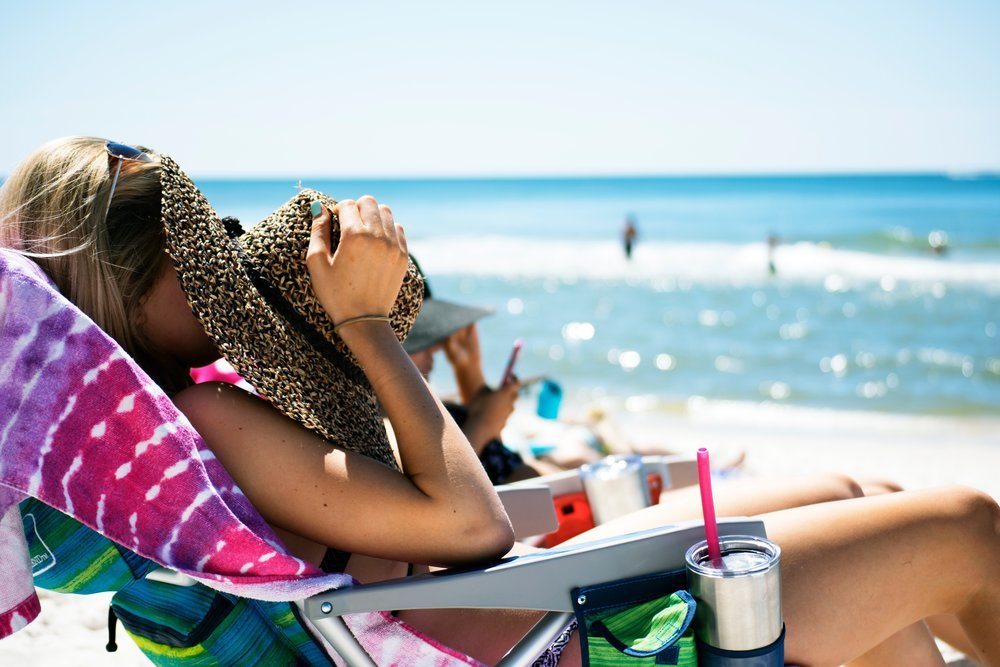Australia has one of the highest skin cancer rates in the world. Skin cancer occurs when skin cells are damaged by over exposure to ultraviolet (UV) radiation from the sun. According to the Australian Cancer Council, sunburn causes 95% of melanomas, the most deadly form of skin cancer.
Unfortunately sun damage isn’t something that only happens to sun worshipers, even a few minutes of exposed unprotected skin can cause problems.
Skin issues from sun exposure can start earlier than you think. Even that sunburn you got as a child can wreak havoc years after the initial burn.
Here are my top 5 tips for minimizing damage to your skin this summer.
1. Avoid heading out into the sun in the middle of the day.
The general recommendation is to avoid sun exposure from about mid morning (10am) to mid afternoon (3pm). This is when the UV rays are at their strongest. In summer, mid morning UV is strong enough to confer a vitamin D benefit with less risk of skin burning compared to midday sun. So opt for that walk or dip in the ocean in the early morning or late afternoon.
2. Use a natural sunscreen.
People are becoming more aware of what they are putting both in their bodies and on their skin. Opting for a natural sunscreen means none of the potentially harmful chemicals while still protecting your skin from UV rays.
Natural sunscreens contain beneficial minerals such as zinc, which act as a barrier blocking UV rays while preserving and protecting the skin. Whereas chemical sunscreens actually absorb the UV rays then neutralize once in the skin.
Sunscreen shouldn’t just be used on a day at the beach. Get in the habit of applying daily to your face and exposed areas.
My favourite brand of natural sunscreen is Wotnot.
3. Take your vitamins.
That’s right; vitamins can help protect your skin from the sun. Research has shown nicotinamide, a form of B3 to be effective in helping minimize sun cancer risk. In a study conducted in 2015, daily oral supplementation of nicotinamide cut the rate of non-melanoma skin cancers by 23% compared with placebo after 1 year among patients at high risk for skin cancer. Further more nicotinamide also reduced the rates of pre cancerous sunspots by around 15%.
Nicotinamide was very well tolerated, with no difference in adverse events, blood results or blood pressure. Nicotinamide is a different form of vitamin B3 to nicotinic acid or niacin. Nicotinic acid commonly causes headaches, flushing and low blood pressure, but these side effects are not seen with nicotinamide.
These finding suggest that continued daily supplementation might prove to be an inexpensive, well tolerated measure in preventing non melanoma skin cancers.
4. Stay hydrated!
Since the skin contains mostly water, any significant amount of loss in the body’s water volume in a day can lead to problems of mild dehydration.
Drinking 2-3 litre’s of water a day is a reasonable guideline, but personal needs may vary, so it’s important to listen to your body. Drinking water will not only hydrate your skin but it will also help to remove toxins from the body.
5. Keep covered!
Lately, stay covered! Wear a hat and sunglasses. Even though you have smothered yourself in sunscreen you still want to look after your eyes and face. These are your most vulnerable parts when it comes to UV rays.
Remember to check your skin regularly and check with your doctor if you notice any changes.


